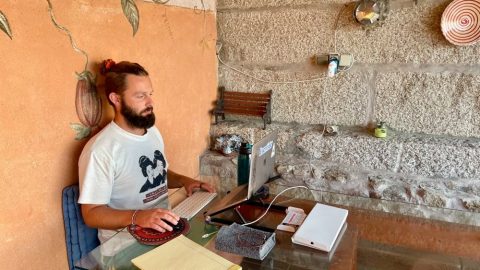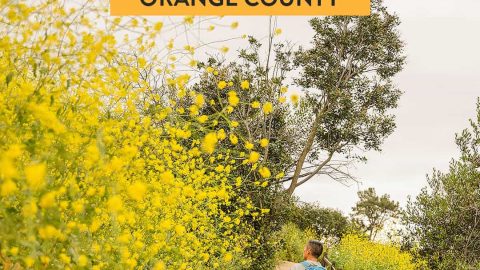(CNN) — There’s hope: Summer vacations abroad may happen in a big way this year.
Vaccines and testing are the way forward, Charles and other industry experts say, but what’s needed perhaps as desperately is greater consistency and coordination across borders.
“When you don’t have a coordinated global approach, it’s very difficult for the industry to go forward, especially when you have the rules of the game changing basically every single day,” said Luis Felipe de Oliveira, director general of Airports Council International (ACI), a global trade organization representing the world’s airports.

Departure testing is one component of making travel safer during the pandemic.
Joseph Okpako/Getty Images
There’s a lot more work to be done in ironing out testing protocols that would allow globetrotters to opt out of quarantines and finding ways to smoothly and securely share vaccination and testing information across borders.
Sovereign nations still decide what’s best for them individually, looking at their own health situations and economies, but progress has been made in getting countries to look more globally at the huge economic force that is travel.
ACI’s de Oliveira says that the summer rebound could mean international air traffic reaching 50% to 60% of previous levels in most countries.
Here are some of the hurdles travelers and the industry will need to get over as travel picks up:
Eliminating quarantines
Mandatory — and shifting — quarantine requirements “basically are killing the process to restart the industry,” de Oliveira said.
When he spoke to CNN Travel, de Oliveira was on day 12 of a 14-day quarantine in Montreal after returning home from a business trip to the Dominican Republic followed by a personal trip to Mexico. He has quarantined four times in the past seven months, spending 56 days at home without the possibility of going out.
That kind of time investment, along with the confusion around requirements — both going and coming home — are big deterrents for people who might otherwise be willing to travel. Safety is essential, but those in the industry are advocating for a more nuanced, layered approach.

Travelers at a hotel in Melbourne, Australia in December had to quarantine after returning from overseas.
WILLIAM WEST/AFP/Getty Images
A test-out mechanism is needed to avoid quarantines, says Tori Emerson Barnes, executive vice president of public affairs and policy at the national nonprofit U.S. Travel Association, which has been advocating for a science-driven, risk-based approach to reopening international travel “in particular looking at the elimination of quarantines if you have the right testing protocol in place.”
While vaccines will be critical, Oliveira and others say the travel industry absolutely cannot afford to wait to ramp up until vaccinations are fully administered globally, making testing an essential part of the equation for safer travel in the near-term.
While U.S. Travel would encourage people to get vaccinated and to test out in places that require quarantines, the association isn’t looking for blanket requirements for access, Barnes said. “We wouldn’t say that you have to have a vaccine to travel.”
She acknowledges that determining who is responsible for creating and implementing consistent protocols is a challenge. “The government doesn’t necessarily want to,” she said, “and I don’t know that the private sector should have that responsibility.”
Yet countries and organizations around the world are making progress in coordinating common approaches, says Alessandra Priante, regional director for Europe at the World Tourism Organization (UNWTO), a specialized agency of the United Nations.
A coordinated way of testing is already being implemented in numerous cases, and the next step at a global level is tracing, Priante says, “to make sure that we’re able to share a certain amount of data, because if we don’t share the data, then we are not really able to have all the information that we should have.”

The travel industry can’t afford to wait until vaccines have been distributed globally to ramp up.
Patrick T. Fallon/AFP/Getty Images
Getting vaccinated … and proving it
Some of that information likely would pertain to vaccinations. The United Kingdom’s vaccination program is well under way. Other countries have also made significant progress, and the United States’ program is slowly ramping up.
Traveler confusion may well ramp up, too, as more people start moving around in the spring and additional requirements come into play for negative tests and proof of vaccination.
We’ll need a harmonized global approach to recognizing and accurately and safely sharing vaccination and testing information, Oliveira said.
Current practices — involving printed paper documents from unknown labs in languages that may be unfamiliar to those inspecting them or a tangle of unconnected databases across the world — are less than ideal.
Even when vaccines do become widely available, not everyone will take them and researchers are looking at whether the virus could be still be transmitted by vaccinated people. Masking, social distancing, sanitation and other safety layers will still be part of daily life — and travel — for a long time to come.

Travel bubbles — like the anticipated two-way corridor between New Zealand and Australia — are among the tailored measures aimed at restoring some international travel.
Jorge Fernández/LightRocket/Getty Images
Measures in the meantime
Seamless international travel won’t happen overnight.
Unfortunately like most things Covid-related, these measures are subject to change.
“Corridors can be useful if they’re consistent, but again, they’ve been up and down, opening and shutting at short notice and that has not helped consumers at all,” said Paul Charles, the travel industry consultant.

Ultimately, travelers would like to get back to safely mixing and mingling with the rest of the world.
ROBIN UTRECHT / Stringer / Getty
The great goal: Mingling with strangers
The UNWTO’s Priante is hoping the ups and downs level out soon because the world is missing out.
“What I regret the most is that all that tourism is about, which is to trust the unknown … the beauty of exploring, of meeting somebody you’ve never met before from another culture, another nation, is all sort of on hold and at stake because people are telling us ‘don’t trust anyone, cross the sidewalk, wear your mask, don’t mingle,’ ” she said from her home in Madrid.
And while Priante and her colleagues have taken every precaution and continued to travel and work to address the global crisis that is threatening livelihoods in the industry, she wants to see more people traveling safely.
“We want to get the spirit of tourism back into the heart of people. Because tourism is about building memories … and we want to get back to that, we want to become again the industry of beautiful memories.”






Recent Comments